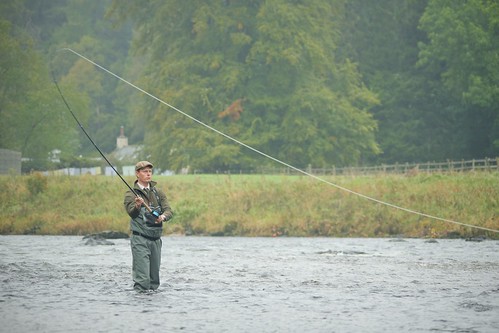If you like to fish, but hate not catching anything, read this article. We’ve written these tips to help you better your technique, catch more fish and have an even better time, so read on!
Consider which way the fish may be migrating in the stream you are fishing in to determine an upstream or downstream cast. If the fish are going upstream in the spring, you would cast ahead of them as they go “uphill”. During the fall season, the fish swim the opposite way, so you should cast your rod downstream.
Observe the birds while you fish. If you find that the birds are flocking to one specific area, there is a good chance there are many fish there. Birds love to eat fish, and therefore are willing to make steep dives to get them. Closely observe their behavior, as it may assist you in having a great day of fishing.
Live bait tends to produce the most bites. Typically, fish dine on the insects native to the body of water that they live in. Fish will be more tempted by bait that is found along the banks where you are fishing. Many expensive artificial lures do more for the fisherman than the fish.
If you are discovering that you’re losing many fish off your lure, then you probably need to thoroughly check the hooks. Many times people fail to realize hooks can be blunt or have damage, which can prevent them from catching fish. Switching your hooks is a great way to make sure that your lures set cleanly and quickly.
Be on the lookout for places with deep water. When you’re riving fishing, look for deep water areas. Usually, fish can be found in these locations, especially when it is warm outside. Another good place to look for them is around big rocks and under rock overhangs. If you locate a particularly good area, keep it in mind for future visits.
Many expert fishermen use lighter grubs. A grub that is colored anywhere from white to chartreuse is usually effective. Translucent grubs are great because they reflect light and attract fish. When you can’t catch anything, switch over to a grub which matches the color of the water.
Hook Properly
Anyone that fishes should be sure and learn how to set the hook properly. Although it is absolutely critical when you go lure fishing, setting your hooks well is important for every kind of fishing. If you don’t set your hook properly, you run the risk of losing your fish.
Be careful not to start a fire when fishing by the creek or riverside. Many people smoke and fish at the same time; make sure your cigarette or the lighter doesn’t catch anything on fire. While the bank might be wet, there is dry foliage all around that can easily catch on fire.
An important tip for all fisherman is to make sure to buy the right fishing license for where you will be fishing. A different license is often required depending on which state you are in. You can buy either a daily license or one for a whole year.
Don’t be wasteful with your fish. While it can make you feel proud to show off a huge collection of fish, over fishing can destroy the ecosystem and make it harder to find fish on your next trip. If you’ve caught more than you can use, turn some of the little ones loose or share your fish with your friends.
Are you wondering why other fishers are more successful than you? Your friends have put in the effort to learn all the different facets of fishing, and now that you have learned some key tips yourself, you are ready to join the fishing elite.
